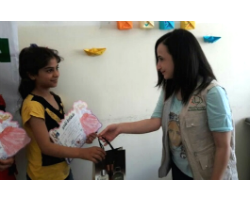The story of Fatima: “We are here to tell people their lives matter”

SIMRO
Fatima Haj Yousef is a psychosocial worker in Afrin, in northern Syria. Before the war she had studied French literature but had to abandon her dreams of becoming a French teacher and was retrained by WHO to serve her community.
Armed conflicts pose significant challenges to the long-term mental health and psychosocial well-being of affected populations. According to the 2018 Syrian Arab Republic Humanitarian Response Plan, 1 in 5 Syrians are at risk of developing moderate mental health issues, and 1 in 30 are at risk of developing severe or acute mental health problems.
“In my work, depression is a big issue, and I speak to a lot of people who have lost their will to live mostly because they don’t have hope for a better future. Many men don’t have jobs, which emasculates them, and women struggle with traumatized children. We are here to tell people their lives matter,” says Fatima.
“I love this job because I can help and support people, to make them feel like their lives can be better. It is not always easy because I get emotionally involved,” she adds.
She recounts a time when an 18-year-old girl came to her after having witnessed her sister commit suicide and was showing signs of severe depression and a tendency to self-harm. The girls had both suffered domestic abuse from their father, and according to Fatima, the girl thought the only way out was to follow in her sister’s footsteps.
“I had to gain her trust and get her to talk about her situation, suggesting ways to overcome those feelings. It was difficult for me not to make false promises, like that I could solve her family problems. I did get her to see that her life mattered, which helped her overcome her depression.”
North-west Syria has only 2 psychiatrists for almost 5 million people, and 2 facilities that have the capacity to treat patients suffering from various mental health disorders. To fill this gap, WHO has trained a network of psychosocial workers to address common mental, neurological and substance abuse disorders.
WHO’s mental health programmes in north-west Syria are supported by the United Kingdom’s Department for International Development.



